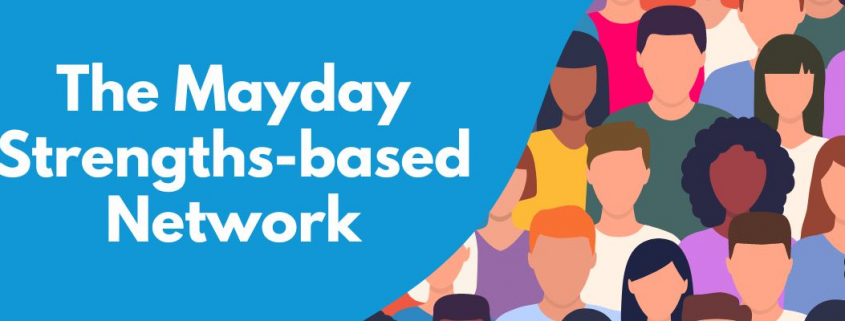Sustaining a change in approach
Alex Fox, Mayday CEO
Meg, a PTS Coach in Northants, recently shared this insight into the experience of someone she was working alongside.
J is a young man who was experiencing homelessness, struggled to access health and mental health services, and had debts unrelated to his own spending. All of this had a negative impact on his mental health.
Initially, J was speaking with Meg several times a week and this was often after or during times of crisis; but today J’s support consists of an exchange of voice notes every couple of months – a change that J initiated. After building an honest and trusting relationship, supporting him to implement tools to respond to sources of stress, such as letters about housing benefit debt, or accommodation challenges. He began to talk about what was important to him, what he enjoyed and was good at – what made his life full. J successfully found work again and even felt empowered to advocate for a higher wage; as well as actively seeking mental health support through his GP, which then allowed him to access medications related to his medical diagnosis. J applied for a Mayday personal budget, a pot of money available to people working alongside a Coach, which paid for driving lessons to enable his career and independence in a rural area. J was able to decide what he wanted his relationship with Meg to look like and has subsequently transformed his situation. J no longer makes emergency calls and uses the skills, resources and support networks he has built up to navigate the ups and downs of life.
For instance, J has recently been made redundant, something that previously he would have struggled with. Rather than returning to previous behaviour patterns of making rushed decisions at the detriment of his mental health, J has taken this in his stride and isn’t rushing into a new work situation. He is giving himself headspace and hasn’t allowed this change to take over his life.
This is just one example of the power of forming a different kind of relationship with someone who has lost trust in services, and who is often ironically labelled by those services as a problem – “complex needs”; “disengaged”; or “challenging.” By recognising that behind every label there is a human, and being open to the idea that it might not be that person who has or is the problem, but the way that a dysfunctional public service system approaches people it wasn’t designed for, Meg walked alongside J as he built a very different future for himself, which has ultimately taken him beyond ‘service land’, hopefully for the long term. For me, this is was strengths-based and person-led work is all about.
Meg would say that it was J who did all the work, but we know how challenging, as well as rewarding, being a Coach or taking a strengths-based approach can be. It brings Coaches and practitioners into contact with people’s trauma and asks them to walk alongside people who are often marginalised and oppressed as they experience conflict with agencies which are used to seeing themselves as the good guys, and those they cannot help as ‘difficult’.
Meg explained her approach as: “To truly see a person and understand where they are at and the barriers they might face, you have to walk a day in their shoes!”
As much as strengths-based work can be hugely worthwhile, it can be equally as lonely. “It can feel like you’re swimming in the wrong direction or going the wrong way down the motorway.” was how someone described it during Wisdom form Strengths-based Working, a deep listening exercise carried out by Mayday to capture the voices of people delivering a strengths-based approach.
Mayday has spent many years developing the PTS Response, as well as working with other organisations to take on the PTS or develop their own strengths-based approach. Initially, I believe it was tempting for us to think that through the PTS we had found the magic formula for change, it was THE way to work. However, through listening and learning from many brilliant people, with a multitude of different experiences, and points of view, we have arrived at the place where, although we still believe wholeheartedly in the PTS and its ability to create more human and fairer systems, we also recognise the magic in others finding their own PTS Response, their own strengths-based formula for change. Because, together we are stronger, change comes more easily and there is more hope for people who are currently being let down by systems that don’t work for them.
This week we officially launch the Mayday Strengths-based Network, something we believe will make this crucial work less of a lonely task and nurture organisations as they navigate a change of approach. It will connect passionate people and offer a supportive space to share learning, gain knowledge and explore ideas. Currently, over 30 skilled, thoughtful and supportive practitioners and Coaches like Meg have joined the Network.
“Some of my best learning comes from the Network spaces!” Explained a Strengths-based practitioner.
The Strengths-based Network allows Coaches and practitioners to share what they learn, celebrate what they achieve with people who know how much it means, and for once, not be the only person in the room who ‘gets it’.
For Mayday, this feels like the next chapter in our mission to create public service systems that work for people going through tough times.


